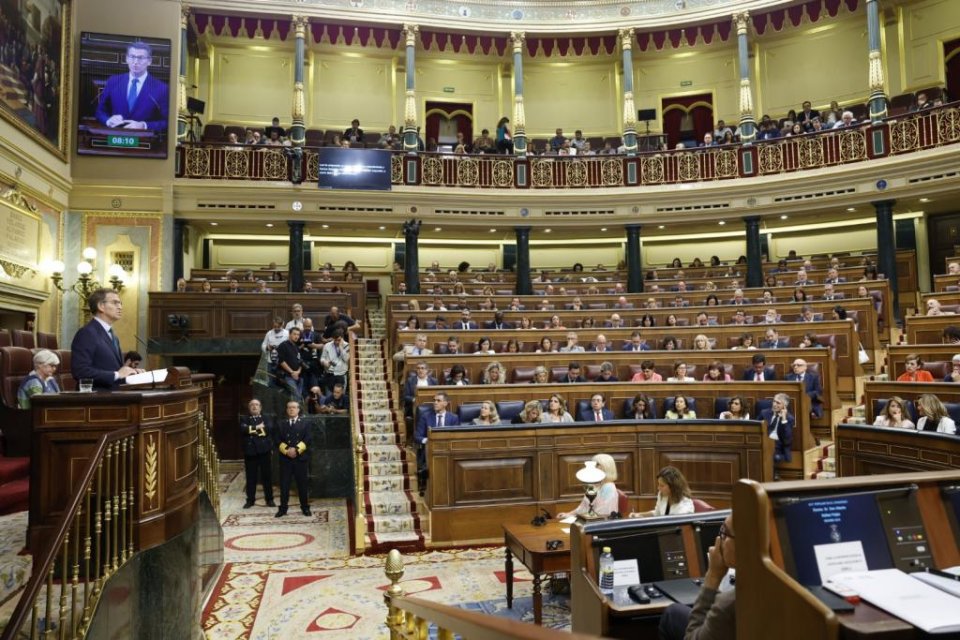With Alberto Núñez Feijóo’s bid to become Spain’s prime minister definitively over after Friday’s second vote, socialist leader Pedro Sánchez, currently the acting prime minister following the inconclusive 23 July election, now faces an opportunity to officially remain prime minister, although the price for securing support from the Catalan pro-independence parties is on the rise.
As expected, the leader of the right-wing People’s Party (PP) failed in his bid to secure support to be inaugurated premier, losing an initial parliamentary vote on Wednesday and a second one on Friday. ALSO READ: The PP’s Alberto Núñez Feijóo loses first parliamentary vote to become PM.
Despite winning the most votes in July’s election, he could only muster the support of 172 MPs on Wednesday from his own PP group (137 seats), the far-right Vox party (33 seats), and the support from two minor parties with one seat each (the Unión del Pueblo Navarra and the Coalición Canaria). Votes against were 178 in the 350-seat parliament.
He needed just a simple majority on Friday which he also failed to secure, with only 172 votes in favour to 177 against. The remaining vote was ruled invalid after one MP accidentally voted in favour when he intended to vote against.
The baton now passes to Sánchez, who in the coming week will be tasked by king Felipe VI with forming a government, and it will have to pass an identical vote to be inaugurated as prime minister before 27 November.
If Sánchez fails, and no government is in place by 27 November, another general election will be held on 14 January.
In power for more than five years, Sánchez, 51, has proved to be a tenacious political survivor and is confident he will be returned to power with the backing of the left-wing Sumar group of parties, along with Basque and Catalan regional parties.
Spain, he said ‘is poised to resume this progressive coalition government in the very near future’, he told a gathering of European socialists on Thursday.
Despite his optimism, negotiations to secure the needed support are becoming increasingly risky.
Although he can count on the support of Sumar and the Basque nationalists, Sánchez now needs to secure the all-important backing of Junts per Catalunya (JxCat), the Catalan pro-independence party cast in the role of kingmaker.
In exchange for its support, JxCat wants an amnesty for those facing legal action over the failed 2017 Catalan separatist bid, which sparked Spain’s worst political crisis in decades. ALSO READ: Puigdemont demands ‘amnesty’ for all independence activists as ‘precondition’ for Sánchez’s investiture.
That would effectively exonerate its leader Carles Puigdemont, who led the independence drive and then fled Spain to avoid prosecution.
Sánchez, who has pardoned several high-level Catalan separatists, has kept his plans under wraps. He hasn’t mentioned the possibility of an amnesty, and only said that he wants to continue ‘normalising’ relations with the northeast region where tensions have decreased in recent years.
The other, more moderate Catalan pro-independence party, the Esquerra Republicana (ERC) group, which regularly propped up Sánchez’s previous coalition government of the PSOE and Podemos, has also upped the ante, demanding talks on holding a referendum on self-determination — a long-term demand of the separatists.
Also Friday, Catalonia’s regional parliament passed a resolution proposed by the ERC and JxCat parties saying they will not back the formation of any national government ‘that does not commit itself to working towards establishing the conditions for holding a referendum’.
Puigdemont headed Catalonia’s government when it staged an independence referendum on 1 October 2017 despite being banned by the courts. It was followed by a short-lived unilateral declaration of independence, sparking Spain’s worst political crisis in decades.
The PP government in power at the time in Madrid immediately sacked Catalonia’s regional government and suspended the wealthy northeastern region’s autonomy.
Catalonia’s pro-independence leaders were either jailed or fled abroad. Sánchez’s PSOE ssocialists appear open to issuing an amnesty despite unease within the party and some of its followers, but have made clear that allowing a referendum would be tantamount to crossing a red line.
‘There is no path in that direction. There has never been and there still is none,’ Salvador Illa, who heads the Catalan branch of the Socialist Party (PSC) and who is close to Sánchez, told Cadena Ser radio on Friday.
‘And if we have to hold new elections, we will and voters can decide. But the path of division and rupture is a dead end,’ he separately told the Rac1 Catalan radio station.
In a statement late on Thursday, the socialists (PSOE) said they wanted to keep discussions alive with the separatists but ‘always in accordance with the Constitution’. That remark effectively killed off the chance of an independence ballot, though it was unclear to what extent each side was setting out its bargaining chips.
Sign up for the FREE Weekly Newsletter from Spain in English.
Please support Spain in English with a donation.
Click here to get your business activity or services listed on our DIRECTORY.



